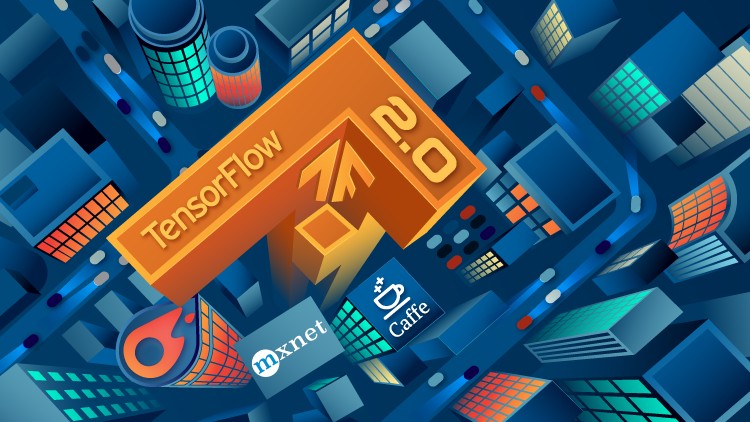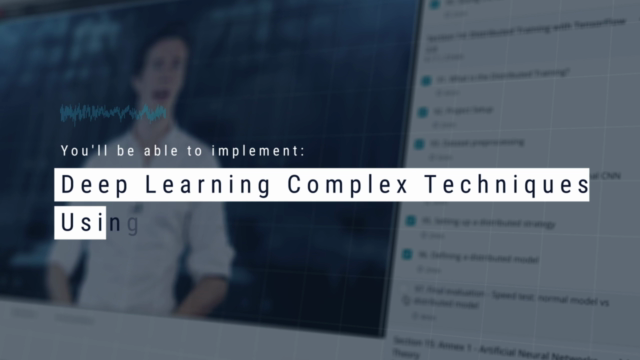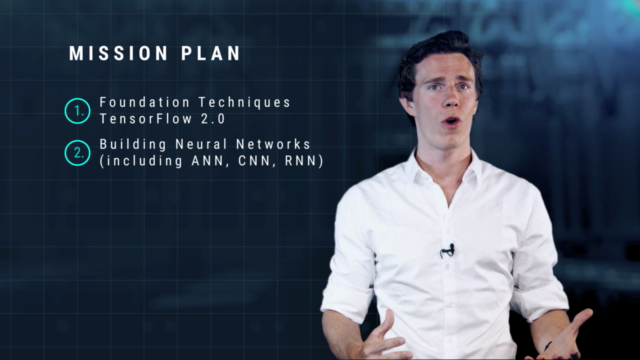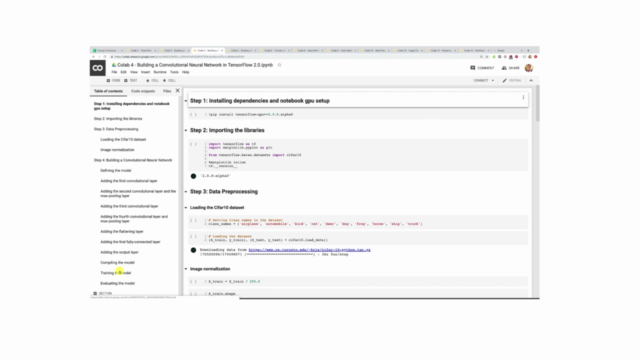A Complete Guide on TensorFlow 2.0 using Keras API

Why take this course?
🎉 Welcome to "A Complete Guide on TensorFlow 2.🐍"! 🚀
Are you ready to unlock the secrets of Artificial Intelligence and Deep Learning using TensorFlow 2.0 and its Keras API? This comprehensive course is designed to take you from a beginner to an expert, covering everything from the basics to advanced applications.
What You'll Learn:
Part 1: Setting Up Your Workspace 🛠️
- Section 1: Understand the technology stack for TensorFlow 2.0.
- Section 2: Get familiar with TensorFlow 2.0 library basics and syntax.
Part 2: Mastering Neural Networks 🧠🤖
- Section 3: Implement Fully Connected Neural Networks (FCNN).
- Section 4: Explore Convolutional Neural Networks (CNN) for image processing.
- Section 5: Dive into Recurrent Neural Networks (RNN) for sequential data.
- Section 6: Apply Transfer Learning to achieve SOTA results on real-world datasets, like the Dogs vs. Cats challenge.
Part 3: Real-World Applications 📈💰
- Learn how to build a Stock Market trading bot using Reinforcement Learning (Deep Q Network).
Part 4: Production-Ready Solutions with TensorFlow Extended (TFX) 🏭🚀
- Section 8: Analyze datasets for anomalies using TensorFlow Data Validation.
- Section 9: Create robust data preprocessing pipelines with TensorFlow Transform.
- Section 10: Build and deploy your own Fashion API with Flask, showcasing a model accessible over the internet.
- Section 11: Enhance your solution to handle massive traffic with TensorFlow Serving.
- Section 12: Optimize models for mobile devices using TensorFlow Lite.
- Section 13: Scale up by training across multiple GPUs or servers using TensorFlow 2.0 distributed training capabilities.
Why This Course? 🌟
- Industry-Relevant: Learn the practical skills that are in high demand.
- Hands-On Learning: Implement real-world AI applications, not just theory.
- Expert Instructor: Guided by Hadelin de Ponteves, a seasoned TensorFlow and Deep Learning expert.
- Comprehensive Curriculum: From the basics to advanced topics, ensuring full understanding of TensorFlow 2.0 and its ecosystem.
What's Inside for You:
- Structured Lessons: Easy-to-follow modules that build upon each other.
- Interactive Projects: Real-world projects to solidify your learning.
- Community Support: Engage with peers and experts in the field.
- Career Boost: Gain skills that can open doors to top AI/ML positions.
Join Us on This Deep Learning Journey! 🧲✨
Whether you're looking to launch a career in AI, enhance your current expertise, or simply satisfy your curiosity about TensorFlow 2.0 and Keras, this course is your gateway to success. Sign up now and start building amazing applications with Deep Learning and Artificial Intelligence! 🎓👨💻👩💻
Course Gallery




Loading charts...
Comidoc Review
Our Verdict
The Complete Guide on TensorFlow 2.0 using Keras API course offers a detailed exploration of TensorFlow 2.0 functionality within the realm of data science applications. While rich in information and covering many essential areas, potential students should be prepared to encounter compatibility issues with outdated notebooks. Some content appears copied from other courses, diminishing credibility, and there's room for improvement in explaining code examples and providing more challenging exercises or quizzes for deeper understanding.
What We Liked
- Comprehensive coverage of TensorFlow 2.0 and its applications in data science, including ANNs, CNNs, RNNs, and Transfer Learning
- Highlights important differences between TensorFlow 1.x and 2.0, aiding learners in the transition
- Introduces building a Machine Learning Pipeline, Data Validation, and Dataset Preprocessing using TensorFlow Data Validation and Transform
- Offers guidance on putting a TensorFlow 2.0 model into production and creating RESTful API with Flask and TensorFlow 2.0
Potential Drawbacks
- Outdated notebooks and libraries causing compatibility issues, leading to errors in code snippets
- Overlap of information within sections and some content appearing to be copied from another course (particularly Pytorch), reducing credibility
- Lack of depth in Reinforcement Learning section; examples poorly explained without comments or descriptions, leaving learners confused and seeking more explanation
- Limited coding exercises and quizzes focusing primarily on syntax, not challenging learners' understanding or application skills